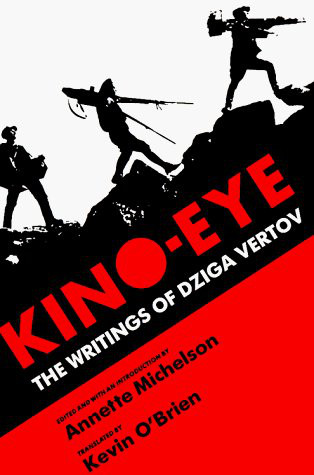Kino-Eye: The Writings of Dziga Vertov (1984)
Filed under book | Tags: · cinema, film, film theory, montage, screen, soviet union

Dziga Vertov was one of the greatest innovators of Soviet cinema. The radical complexity of his work—in both sound and silent forms—has given it a central place within contemporary theoretical inquiry. Vertov’s writings, collected here, range from calculated manifestos setting forth his heroic vision of film’s potential to dark ruminations on the inactivity forced upon him by the bureaucratization of the Soviet state.
Edited and with an introduction by Annette Michelson
Translated by Kevin O’Brien
Publisher University of California Press, 1984
ISBN 0520056302, 9780520056305
408 pages
PDF (no OCR; updated on 2014-1-4)
Comment (1)Brian McNair: Glasnost, Perestroika and the Soviet Media (1991)
Filed under book | Tags: · journalism, mass media, politics, soviet union, television

Soviet journalists are at the center of the tumultuous changes taking place in the USSR today. As Stalinist regimes across Eastern Europe are dismantled, the reforms of Mikhail Gorbachev have transformed Soviet political, social and economic life.
Glasnost, Perestroika and the Soviet Media examines the implications of these changes for the Soviet news and television media. It traces the development of Soviet journalism through the writings of Marx and Lenin, the distortions of Stalin and Brezhnev, and the reforms of the Gorbachev era, culminating in the new press law, which provides greater freedom of the press and freedom of information.
The discussion is accompanied by analysis of the content of Soviet print and television journalism, including chapters on Soviet news coverage of the superpower summits in Rejkyavik and Moscow, a comparison of Soviet and Western reporting of international affairs, and the impact of glasnost on Soviet media images of women.
Publisher Routledge, 1991
ISBN 0415035511, 9780415035514
Length 231 pages
PDF (updated on 2012-7-27)
Comments (2)Slava Gerovitch: From Newspeak to Cyberspeak: A History of Soviet Cybernetics (2004)
Filed under book | Tags: · computing, cybernetics, history of computing, history of science, history of technology, soviet union, technology

“In this book, Slava Gerovitch argues that Soviet cybernetics was not just an intellectual trend but a social movement for radical reform in science and society as a whole. Followers of cybernetics viewed computer simulation as a universal method of problem solving and the language of cybernetics as a language of objectivity and truth. With this new objectivity, they challenged the existing order of things in economics and politics as well as in science.
The history of Soviet cybernetics followed a curious arc. In the 1950s it was labeled a reactionary pseudoscience and a weapon of imperialist ideology. With the arrival of Khrushchev’s political “thaw,” however, it was seen as an innocent victim of political oppression, and it evolved into a movement for radical reform of the Stalinist system of science. In the early 1960s it was hailed as “science in the service of communism,” but by the end of the decade it had turned into a shallow fashionable trend. Using extensive new archival materials, Gerovitch argues that these fluctuating attitudes reflected profound changes in scientific language and research methodology across disciplines, in power relations within the scientific community, and in the political role of scientists and engineers in Soviet society. His detailed analysis of scientific discourse shows how the Newspeak of the late Stalinist period and the Cyberspeak that challenged it eventually blended into “CyberNewspeak.””
Published by MIT Press, 2004
ISBN 0262572257, 9780262572255
383 pages
Key terms:
newspeak, Norbert Wiener, dialectical materialism, Soviet Union, machine translation, Moscow University, John von Neumann, structural linguistics, Stalin, Stalinist, information theory, Roman Jakobson, servomechanisms, Andrei Markov, Cold War, Andrei Kolmogorov, Liapunov, entropy, Pavlovian, BESM
PDF (updated on 2017-10-25)
Comment (1)
